Khang Le
equal contribution
ConStruct: Structural Distillation of Foundation Models for Prototype-Based Weakly Supervised Histopathology Segmentation
Dec 11, 2025Abstract:Weakly supervised semantic segmentation (WSSS) in histopathology relies heavily on classification backbones, yet these models often localize only the most discriminative regions and struggle to capture the full spatial extent of tissue structures. Vision-language models such as CONCH offer rich semantic alignment and morphology-aware representations, while modern segmentation backbones like SegFormer preserve fine-grained spatial cues. However, combining these complementary strengths remains challenging, especially under weak supervision and without dense annotations. We propose a prototype learning framework for WSSS in histopathological images that integrates morphology-aware representations from CONCH, multi-scale structural cues from SegFormer, and text-guided semantic alignment to produce prototypes that are simultaneously semantically discriminative and spatially coherent. To effectively leverage these heterogeneous sources, we introduce text-guided prototype initialization that incorporates pathology descriptions to generate more complete and semantically accurate pseudo-masks. A structural distillation mechanism transfers spatial knowledge from SegFormer to preserve fine-grained morphological patterns and local tissue boundaries during prototype learning. Our approach produces high-quality pseudo masks without pixel-level annotations, improves localization completeness, and enhances semantic consistency across tissue types. Experiments on BCSS-WSSS datasets demonstrate that our prototype learning framework outperforms existing WSSS methods while remaining computationally efficient through frozen foundation model backbones and lightweight trainable adapters.
Entropic Gromov-Wasserstein between Gaussian Distributions
Aug 24, 2021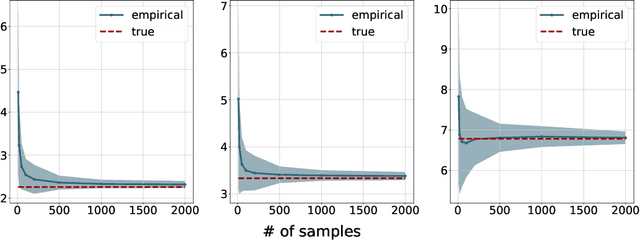
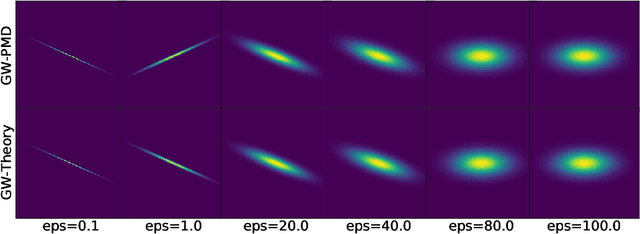
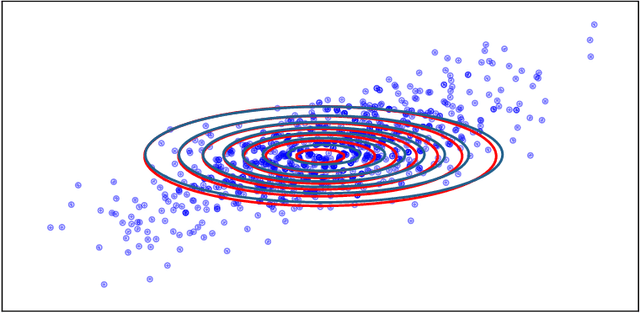
Abstract:We study the entropic Gromov-Wasserstein and its unbalanced version between (unbalanced) Gaussian distributions with different dimensions. When the metric is the inner product, which we refer to as inner product Gromov-Wasserstein (IGW), we demonstrate that the optimal transportation plans of entropic IGW and its unbalanced variant are (unbalanced) Gaussian distributions. Via an application of von Neumann's trace inequality, we obtain closed-form expressions for the entropic IGW between these Gaussian distributions. Finally, we consider an entropic inner product Gromov-Wasserstein barycenter of multiple Gaussian distributions. We prove that the barycenter is Gaussian distribution when the entropic regularization parameter is small. We further derive closed-form expressions for the covariance matrix of the barycenter.
On Multimarginal Partial Optimal Transport: Equivalent Forms and Computational Complexity
Aug 18, 2021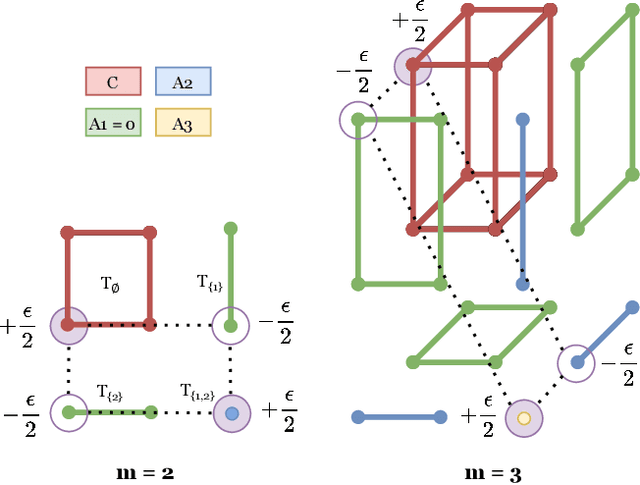
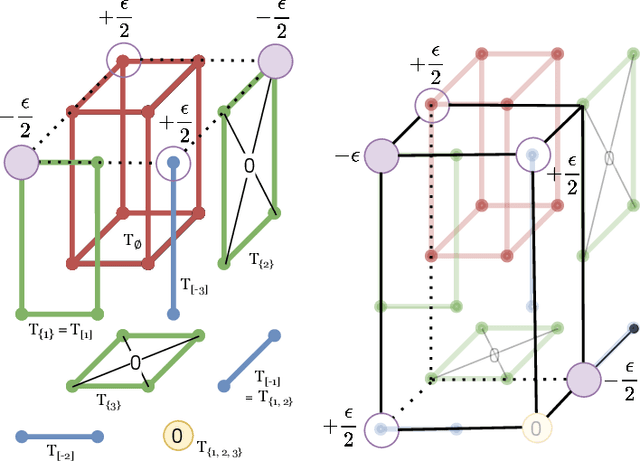
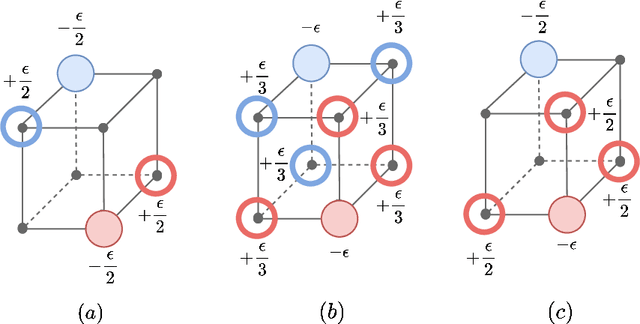
Abstract:We study the multi-marginal partial optimal transport (POT) problem between $m$ discrete (unbalanced) measures with at most $n$ supports. We first prove that we can obtain two equivalence forms of the multimarginal POT problem in terms of the multimarginal optimal transport problem via novel extensions of cost tensor. The first equivalence form is derived under the assumptions that the total masses of each measure are sufficiently close while the second equivalence form does not require any conditions on these masses but at the price of more sophisticated extended cost tensor. Our proof techniques for obtaining these equivalence forms rely on novel procedures of moving mass in graph theory to push transportation plan into appropriate regions. Finally, based on the equivalence forms, we develop optimization algorithm, named ApproxMPOT algorithm, that builds upon the Sinkhorn algorithm for solving the entropic regularized multimarginal optimal transport. We demonstrate that the ApproxMPOT algorithm can approximate the optimal value of multimarginal POT problem with a computational complexity upper bound of the order $\tilde{\mathcal{O}}(m^3(n+1)^{m}/ \varepsilon^2)$ where $\varepsilon > 0$ stands for the desired tolerance.
On Robust Optimal Transport: Computational Complexity, Low-rank Approximation, and Barycenter Computation
Feb 13, 2021

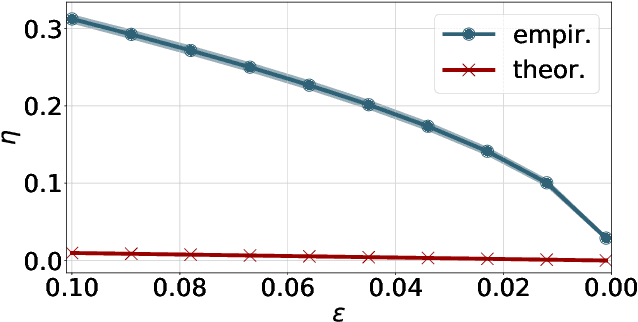

Abstract:We consider two robust versions of optimal transport, named $\textit{Robust Semi-constrained Optimal Transport}$ (RSOT) and $\textit{Robust Unconstrained Optimal Transport}$ (ROT), formulated by relaxing the marginal constraints with Kullback-Leibler divergence. For both problems in the discrete settings, we propose Sinkhorn-based algorithms that produce $\varepsilon$-approximations of RSOT and ROT in $\widetilde{\mathcal{O}}(\frac{n^2}{\varepsilon})$ time, where $n$ is the number of supports of the probability distributions. Furthermore, to reduce the dependency of the complexity of the Sinkhorn-based algorithms on $n$, we apply Nystr\"{o}m method to approximate the kernel matrix in both RSOT and ROT by a matrix of rank $r$ before passing it to these Sinkhorn-based algorithms. We demonstrate that these new algorithms have $\widetilde{\mathcal{O}}(n r^2 + \frac{nr}{\varepsilon})$ runtime to obtain the RSOT and ROT $\varepsilon$-approximations. Finally, we consider a barycenter problem based on RSOT, named $\textit{Robust Semi-Constrained Barycenter}$ problem (RSBP), and develop a robust iterative Bregman projection algorithm, called $\textbf{Normalized-RobustIBP}$ algorithm, to solve the RSBP in the discrete settings of probability distributions. We show that an $\varepsilon$-approximated solution of the RSBP can be achieved in $\widetilde{\mathcal{O}}(\frac{mn^2}{\varepsilon})$ time using $\textbf{Normalized-RobustIBP}$ algorithm when $m = 2$, which is better than the previous complexity $\widetilde{\mathcal{O}}(\frac{mn^2}{\varepsilon^2})$ of IBP algorithm for approximating the Wasserstein barycenter. Extensive experiments confirm our theoretical results.
On Unbalanced Optimal Transport: An Analysis of Sinkhorn Algorithm
Feb 09, 2020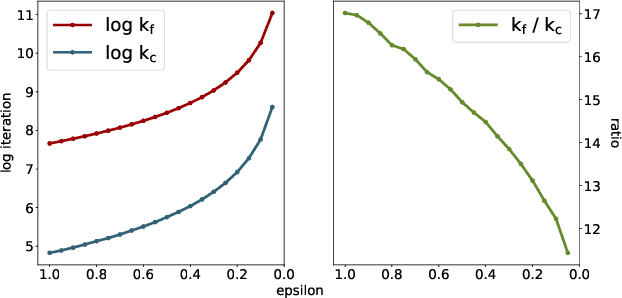
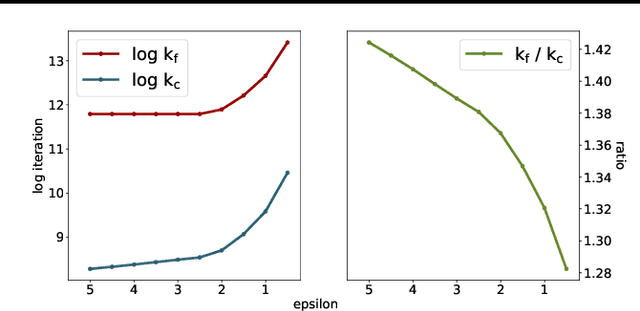
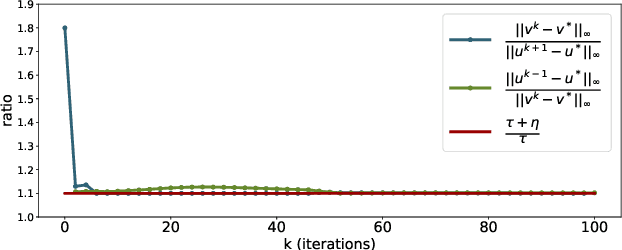
Abstract:We provide a computational complexity analysis for the Sinkhorn algorithm that solves the entropic regularized Unbalanced Optimal Transport (UOT) problem between two measures of possibly different masses with at most $n$ components. We show that the complexity of the Sinkhorn algorithm for finding an $\varepsilon$-approximate solution to the UOT problem is of order $\widetilde{\mathcal{O}}(n^2/ \varepsilon)$, which is near-linear time. To the best of our knowledge, this complexity is better than the complexity of the Sinkhorn algorithm for solving the Optimal Transport (OT) problem, which is of order $\widetilde{\mathcal{O}}(n^2/\varepsilon^2)$. Our proof technique is based on the geometric convergence of the Sinkhorn updates to the optimal dual solution of the entropic regularized UOT problem and some properties of the primal solution. It is also different from the proof for the complexity of the Sinkhorn algorithm for approximating the OT problem since the UOT solution does not have to meet the marginal constraints.
 Add to Chrome
Add to Chrome Add to Firefox
Add to Firefox Add to Edge
Add to Edge